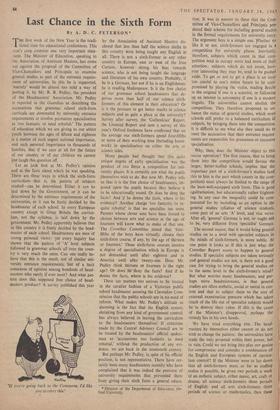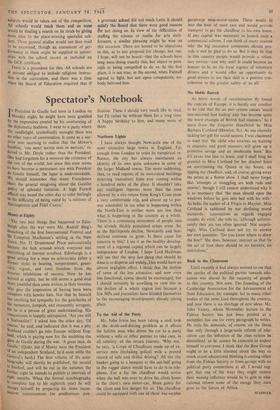Last Chance in the Sixth Form.
By A. D. C. PETERSON* HE first week of the New Year is the tradi- tional time for educational conferences. This ear's crop contains one very important state- ment. The Minister of Education, speaking to the Association of Assistant Masters, has come out against the proposal of the Committee of Vice-Chancellors and Principals to examine general studies as part of the entrance require- ment of universities. In this he is supported, `warmly' would be almost too mild a way of putting it, by Mr. R. R. Pedley, the president of the Headmasters' Association. Mr. Pedley is reported in the Guardian as describing the accusations that grammar school sixth-form curricula are dominated by university entrance requirements or involve premature specialisation as 'too fantastic to need rebuttal.' The pattern of education which we are giving to our ablest youth between the ages of fifteen and eighteen is a matter of such urgent national importance, and such personal importance to thousands of families, that if we care at all for the future of our country or of our children we cannot just laugh this question off.
Let us look first at Mr. Pedley's opinion and at the facts about which he was speaking. There are three ways in which the sixth-form curriculum—that is, the pattern of subjects studied—can be determined. Either it can be laid down by the Government, or it can be determined by the entrance requirements of the universities, or it can be freely decided by the headmaster of each school. In every European country except in Great Britain the curricu- lum, not the syllabus, is laid down by the government. Mr. Pedley apparently believes that in this country it is freely decided by the head- master of each school. Headmasters are men of strong personal views: yet every inquiry has shown that the pattern of 'A' level subjects followed in grammar schools all over the coun- try is very much the same. Can one really be- lieve that this is the result, not of similar uni- versity entrance requirements, but of a tacit consensus of opinion among hundreds of head- masters who rarely if ever meet? And what pat- tern does this supposed free choice of head- masters produce? A survey published this year 7f you're going back to the Commons, I'd like you to carry this.'
by the Association of Assistant Masters dis- closed that less than half the science sixths in this country were being taught any English at all. There is not a sixth-former in any other country in Europe, east or west of the Iron Curtain, however strong his bias towards science, who is not being taught the language and literature of his own country. Probably, if he is a German, but not if he is an Englishman, he is reading Shakespeare. Is it the free choice of our grammar school headmasters that de- prives more than half of our science sixth- formers of this element in their education? Or is it the pressure to get better marks in science subjects and so gain a place at the university? Survey after survey, the 'Gulbenkian' Report. the Linstead Report and now a survey of this year's Oxford freshmen have confirmed that on the average our sixth-formers spend four-fifths or more of their working time (including home- work) in specialisation on either the arts or science sides.
Many people had thought that this quite unique degree of early specialisation was the product of too fierce a competition for uni- versity places. It is certainly not what the pupils themselves wish to do. But now Mr. Pedley tells us that it is the free choice of headmasters, im- posed upon the pupils because they believe it to be educationally sound. Or does he deny the facts? And if he denies the facts, where is his evidence? Another charge 'too fantastic to re- quire rebuttal' is that we specialise too soon. Parents whose clever sons have been forced to choose between arts and science at the age of fourteen will know what to make of that one. The Crowther Committee stated that 'four- fifths of the boys have virtually chosen their sixth-form course, if any, by the age of thirteen or fourteen.' These sixth-form courses involve a degree of specialisation which in Europe is not demanded until after eighteen and in America until after twenty-one. Does Mr. Pedley think thirteen or fourteen is the right age? Or does he' deny the facts? And if he denies the facts, where is his evidence?
These are matters too serious to be treated in the cavalier fashion of a Victorian public school headmaster assuring the Clarendon Com- mission that the public schools are in no need of reform. What makes Mr. Pedley's attitude so alarming is the fact that the English system, shrinking from any kind of government control. has always believed in leaving the curriculum to the headmasters themselves: If criticisms made by the Central Advisory Council are to be treated by the headmasters' official spokes- man as `accusations too fantastic to need rebuttal,' without the production of any evi- dence, we are back in the nineteenth century. But perhaps Mr. Pedley, in spite of his official position, is not representative. There have cer- tainly been many headmasters recently who have complained that it was indeed the pressure of university requirements that prevented them from giving their sixth form a general educa- * Director of the Department of Education. Ox- ford University. tion. It was in answer to these that the Com- mittee of Vice-Chancellors and Principals pro- duced their scheme for including general studies in the formal requirements for university entry. The argument here is a simple one. Whether we like it or not, sixth-formers are engaged in a competition for university places. Inevitably, therefore, subjects which count in that com- petition tend to occupy more and more of their attention: subjects which do not count, how- ever interesting they may be, tend to be pushed aside. To get or not to get a place is an issue too crucial to one's entire future to be com- promised by playing the violin, reading Brecht in the original if one is a scientist, or following up an interest in astronomy if one is a modern linguist. The universities cannot abolish the competition. They therefore proposed to en- hance the status of general studies, which most schools still prefer to a balanced curriculum of subjects, by bringing them into the competition. It is difficult to see what else they could do to meet the accusation that their entrance require- ments are responsible for premature or excessive specialisation.
Why, then, does the Minister object to this rescue operation? The first reason, that. to bring them into the competition would favour the larger, better-staffed schools, implies that the important part of a sixth-former's studies (and this to him is the part which counts in the com- petition) must always be limited to the range of the least-well-equipped sixth form. This is good egalitarianism, but educationally rather frighten- ing. In any case the inequality could be com- pensated for by including, as an option in the general studies syllabus of science students, some part of an arts 'A' level, and vice versa. After all, 'general' German is not, or ought not to be, very different from 'specialist' German. The second reason, that it would bring general studies on to a level with specialist subjects in the minds of sixth-formers, is more subtle. At one point it looks as if this is just what the Crowther Report wants to happen to general studies. If specialist subjects are taken seriously and general studies are not, is there not a good case for trying to bring the general studies on to the same level in the sixth-former's mind? But what worries many headmasters, and per- haps more headmistresses, is that general studies are often xsthetic, social or moral in con- tent and that to subject them to the sort of external examination pressure which has taken much of the life out of specialist subjects would be to destroy their value. If this is the cause of the Minister's disapproval, perhaps the remedy lies in his own hands.
We have tried everything else. The head- masters by themselves either cannot or do not wish to change the pattern: the universities have made the only proposal within their power, but in vain. Could we not bring into play our genius for compromise and consider a combination of the English and European systems of curricu- lum control? If the Minister were to lay down that all sixth-formers must, as far as staffing makes it possible, be given two periods a week of an msthetic subject, either music, art, craft or drama; all science sixth-formers three periods of English; and all arts sixth-formers three periods of science or mathematics, then these
subjects would be taken out of the competition. All schools would teach them and so none would be stealing a march on its rivals by giving More time to the place-winning specialist sub- jects. These general studies would not then need to be examined, though an assessment of per- formance in them might be supplied to univer- sities with the school record or included on the GCE certificate.
There is a precedent for this. All schools are at Present obliged to include religious instruc- tion in the curriculum, and there was a time When the Board of Education required that if
a grammar school did not teach Latin it should satisfy the Board that there were good reasons for not doing so. In view of the difficulties of staffing the science or maths for arts sixth- formers, a similar phrasing might be wise on this occasion. There are bound to be objections to this, as to any proposal for change, but one, I hope, will not be heard—that the schools have long been doing exactly this, but object in prin- ciple to being compelled to do so. In the first place, it is not true; in the second, when Falstaff agreed to fight, but not upon compulsion, no- body believed him.































 Previous page
Previous page